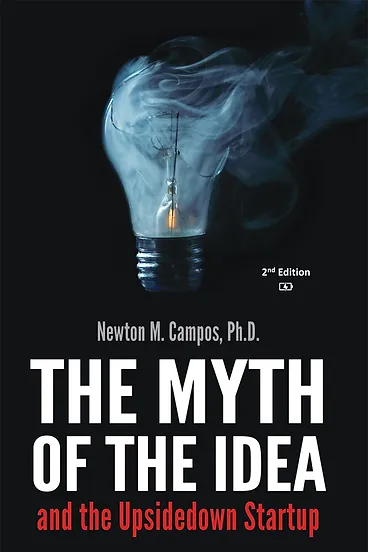David Lovejoy
4
min read
Entrepreneurial Success
Newton M. Campos
IE University | Professor
Top 3 Takeaways
Embracing Cultural Diversity and Adaptability: Prof. Newton M. Campos's global experiences underscore the importance of being open to diverse cultures and ideas for personal and professional growth. His entrepreneurial approach, shaped by his experiences across different cultures, focuses on people-centric development and balancing various aspects of life.
Effectuation and Innovation: The journey of entrepreneurship is closely tied with innovation. Newton emphasizes the concept of effectuation, which advocates for organic growth by leveraging existing resources. This approach has proven successful in numerous cases, demonstrating the potential for innovation within established businesses.
Revisiting the Past to Innovate for the Future: As the digital economy continues to evolve, entrepreneurs need to adapt and explore new business models. The search fund model, which values learning from past experiences and leveraging existing knowledge, offers a promising alternative to traditional startups. This concept, encapsulated in the Japanese phrase onkochishin (温故知新), is gaining traction as a more efficient and secure way to establish and grow businesses in an entrepreneurial way.
The New Age of Entrepreneurship
In today's rapidly evolving business landscape, entrepreneurs must embrace cultural diversity and remain adaptable to thrive. By exposing ourselves to different cultures and ideas, we can develop a more balanced and human-centred approach to both our personal and professional lives. This article will explore the power of entrepreneurship and innovation through the unique journey of Prof. Newton M. Campos, whose global experiences have shaped his approach to business. Having lived and worked in Brazil, Australia, Spain, India, France and Western Africa, Newton's exposure to diverse cultures expanded his understanding of the world and its people.
A Journey Through Cultures
For example, living in India exposed Newton to the profoundly spiritual nature of the culture and its widespread belief in reincarnation. In contrast, his time in Western Africa made him realize the importance of community and the redefinition of the concept of family. His experiences fostered a higher value on connection and well-being and taught him the importance of openness and adaptability in navigating unfamiliar environments. This mindset combined with his own family business experience in Latin America, led him to practice and research entrepreneurship and innovation, focusing on people-centric development and balancing material, action-based and spiritual aspects of life.
Defining Entrepreneurship: A Historical Perspective
Joseph Schumpeter, often regarded as the father of entrepreneurship, outlined five classic definitions of entrepreneurship: introducing a new product, finding a new way to sell or distribute a product, discovering a new source of raw materials, exploring a new market with an existing product, or reorganizing an industry even through mergers and acquisitions. Analyzing these definitions reveals that innovation is an essential aspect of entrepreneurship. In essence, without innovation, there is no entrepreneurship, and without entrepreneurship, there is no Capitalism. Newton stresses that entrepreneurial success is tied to innovation, and herein lies a challenge—with innovation being the creation of something new and perceived as new by others—this often results in entrepreneurs being ahead of their time, which can lead to failure due to wrong timing, as quite often they are too early in introducing their innovations to society.
The Power of Small Businesses
Many entrepreneurs begin working on ideas they believe will be significant in the future but often give up too early due to a lack of key resources such as capital, key collaborators or even motivation. Interestingly, most entrepreneurs in history successfully innovate within established, "boring" businesses rather than launching startups with capital and technology from the beginning. So, small businesses are the most reliable form of innovating in an entrepreneurial way, according to Newton and supported by his scientific research thus far. One key aspect of Newton’s entrepreneurial approach lies in Effectuation, a concept developed by Professor Saras D. Sarasvathy, which posits that successful entrepreneurs grow organically by leveraging existing resources, allowing them to innovate and create new value within their industries. Newton's focus on effectuation in his book "The Myth of the Idea" (2020) led to the acceptance of his bid for a World Bank project, which helped more than 80% of the entrepreneurs he worked with in West Africa succeed. In one of the multiple cases, a chicken coop was transformed into a thriving farm, growing from 3-5 employees to over 100.
The Rise of Search Funds
Entrepreneurs must constantly adapt, iterate, and explore new business models as the digital economy continues to evolve. The traditional startup model is being scrutinized, now being enriched by more scientifically grounded models such as search funds, a method that emphasizes learning from what has been already built and from the experience of others. This concept is encapsulated in a Japanese phrase that is near and dear to Newton’s heart, onkochishin (温故知新), which can be translated to mean revisiting the past to gain new knowledge and getting a new perspective on things. This is also gaining traction in the private equity world as a more efficient and secure way to establish and grow businesses in an entrepreneurial way.
The search fund model involves locating and acquiring an existing company and leveraging the knowledge and experience of its employees and newcomers to achieve new heights. This approach celebrates the wisdom and expertise already present in the company, often a former family-owned business, resulting in a more efficient path to success. While the search fund model offers a promising alternative to the startup, it's essential to educate and encourage aspiring entrepreneurs to consider this paradigm shift as an efficient and secure path to success.
In conclusion, by embracing cultural diversity, effectuation, and innovative business models like the search fund model, entrepreneurs can drive sustainable growth while maintaining a delicate balance in an ever-changing world.




